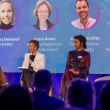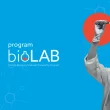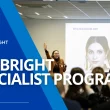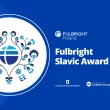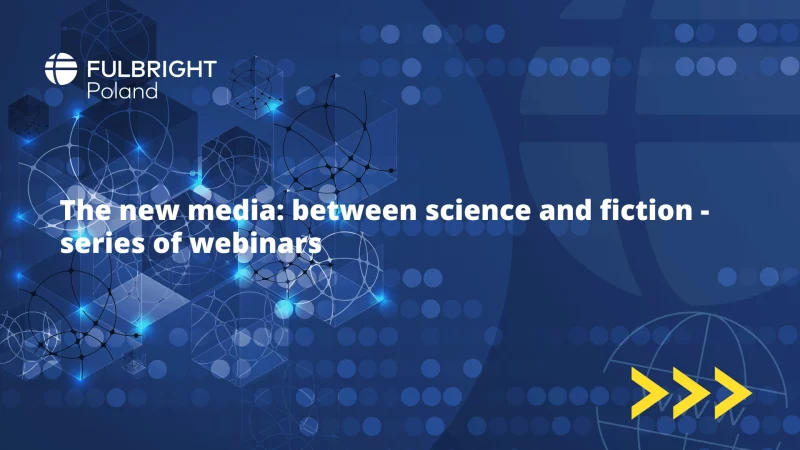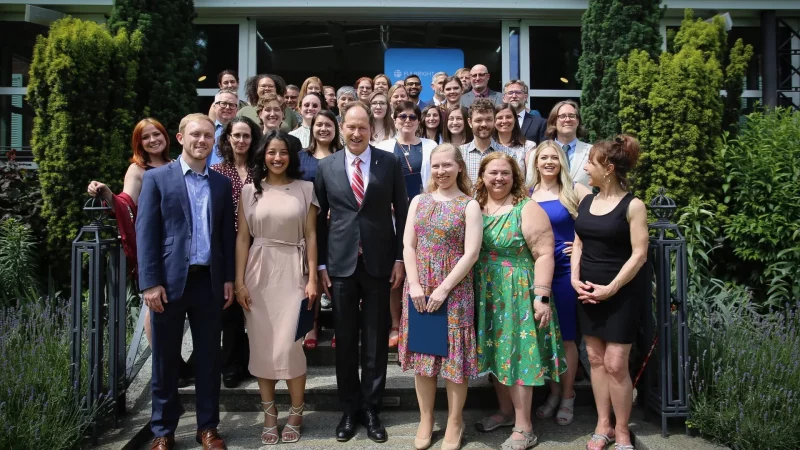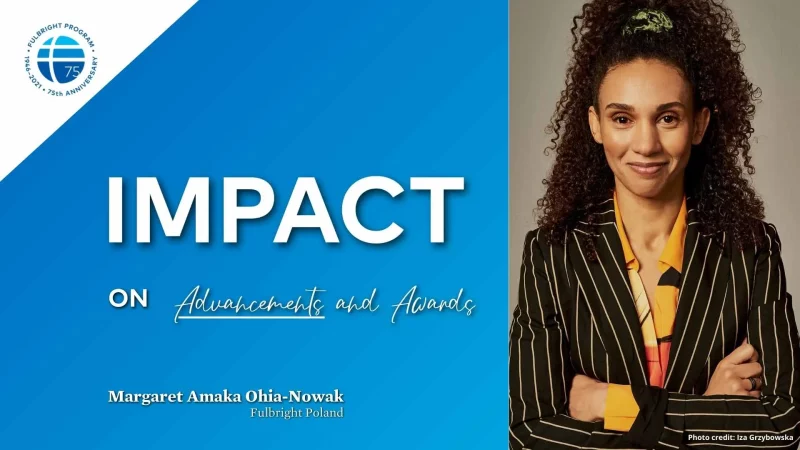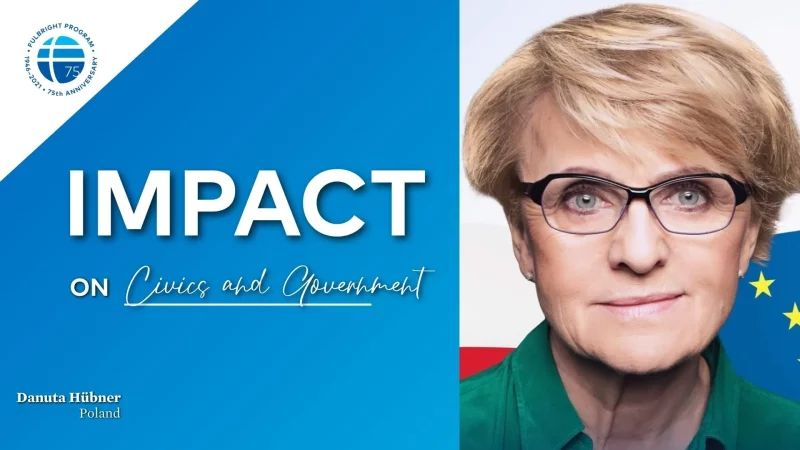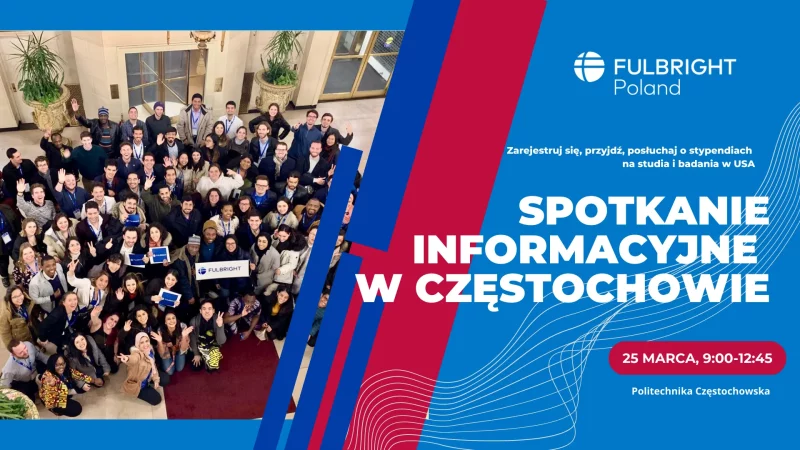Nowe technologie i media cyfrowe kształtują dzisiejszy świat, a wraz z nim naszą dietę medialną, poglądy polityczne, praktykę edukacyjną i społeczeństwo jako całość.
Rozwój technologii stworzył zarówno szanse, jak i zagrożenia dla sposobu, w jaki myślimy o informacji – jej tworzeniu i konsumpcji, czy edukacji – zarówno o nauczaniu, jak i uczeniu się. Dziś, w dobie pandemii, widzimy to jeszcze wyraźniej niż kiedykolwiek.
W tej serii seminariów internetowych zapraszamy prelegentów – ekspertów i praktyków – do omówienia tematów związanych z umiejętnością korzystania z mediów i technologią. Od mediów i fałszywych wiadomości po edukację i naukę – naszym celem jest podnoszenie świadomości na temat tego, jak technologia i nowe media zmieniają nasze codzienne życie. Dołącz do dyskusji – webinaria są otwarte dla wszystkich zainteresowanych. Wymagana jest rejestracja.
Projekt zorganizowany przez Polsko-Amerykańską Komisję Fulbrighta dzięki dofinansowaniu przez Departament Stanu USA z puli specjalnych środków Kongresu.
How recommendation algorithms rule our (media) worlds and what we can do about them
January 28, 2021 at 4:00-5:30 CET
Recommendation algorithms are all around us – suggesting connections on social networks, videos we should watch, songs to listen to, and much more. This session introduces and explains recommendation algorithms for a non-technical audience. It explains where we encounter recommendation algorithms, how they function, and why they are used so widely. It also explains how they influence our information and media diets, and mediate our whole online (and frequently offline!) experience.
Varoon Bashyakarla
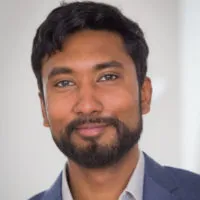
Varoon Bashyakarla is a data scientist in Berlin whose work explores how personal data is becoming a political asset around the world. Before moving to Berlin, Varoon worked in Silicon Valley as a data scientist at Wealthfront and Dropbox. Varoon was also a Fellow at the Eric and Wendy Schmidt Data Science for Social Good Fellowship, a Transatlantic Digital Debates Fellow, and most recently an awardee of the McCloy Fellowship from the American Council on Germany. Varoon received his bachelor’s degree in statistics and economics from Yale University.
Becky Kazansky
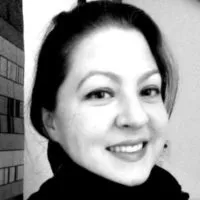
Becky Kazansky has been researching and supporting efforts to defend privacy, digital security, and data justice since 2009. She has worked with civil society organisations such as the Ford Foundation and Tactical Tech, serves as an independent advisor on human rights & technology issues, and is currently finalising her doctorate at the University of Amsterdam as a joint candidate in political science and media studies. Her doctoral research investigates emerging practices of resistance to contemporary data-driven surveillance, including civil society efforts to counter the injustices of automated systems and AI. She is a research associate with the European Research Council-funded DATACTIVE project on the ‘politics of big data according to civil society’, and has served as a lecturer and adviser on the ethics of cybersecurity and data science at the Informatics Institute. Her research has been published in international peer-reviewed journals such as Big Data & Society, New Media & Society, Internet Policy Review, Fibreculture, and International Studies Perspectives.
Moderator
Łukasz Król
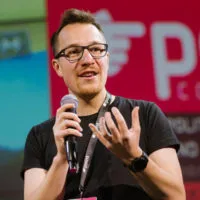
With a background in technology and political science, Łukasz studies the ways in which we can bridge our technological and social realities. He is a researcher, lecturer and workshop facilitator. Łukasz currently focuses on issues such as algorithmic bias and inequality as well as the wider relationship between humans and technology. See more…
This webinar is part of our celebration of the 75th anniversary
Fake news in science and how to fight it
February 18, 2021 at 3:00-4:30 pm CET
The aim of this webinar is to discuss the topic of “fake news” in science: what it is, how it emerges, circulates and grows, as well as to analyze the role of (social) media in this process. It offers ways of counteracting fake news, conspiracy theories and bogus science, as well as shows how certain standards help us fight these phenomena. The panelists discussed what can be done to help elevate the level of trust towards science and scientists.
Anna M. Czarnecka

Anna M. Czarnecka, DSc MD PhD, is a physician and molecular biologist. She currently works as a specialist in clinical oncology at the Department of Soft Tissue/Bone Sarcoma & Melanoma, Maria Sklodowska-Curie National Research Institute of Oncology and in the Department of Experimental Pharmacology of Mossakowski Medical Research Centre. She is a graduate of the Medical University of Warsaw and the University of Warsaw. In addition, she is also a graduate of postgraduate studies in innovation management in the health sector (Kozminski University). Her research focuses on drug resistance and the search for new clinical and molecular predictive and prognostic markers for melanoma and sarcomas.
She completed numerous trainings and international internships. She is the recipient of many awards, including scholarships from the Goldman Sachs Foundation, Kościuszkowska Foundation and Fulbright Program, as well as the Mentoring and START Programs of the Foundation for Polish Science, the L’Oreal Scholarship for Women and Science, and finally “Kryształka Zwierciadła” for scientific achievements and approach to the patient.
Starting in 2020, she holds the position of Deputy Director for Science at the Maria Sklodowska-Curie National Research Institute of Oncology.
Doug Specht
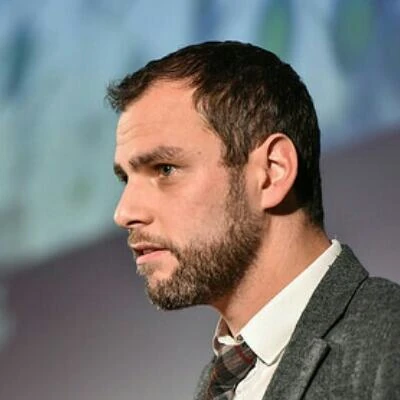
Doug Specht is a Chartered Geographer (CGeog. FRGS), a Senior Lecturer (SFHEA) and the Director of Teaching and Learning in the School of Media and Communication at the University of Westminster. His research examines how knowledge is constructed and codified through digital and cartographic artefacts, focusing on development issues in Latin America and Sub-Saharan Africa, where he has carried out extensive fieldwork. He also writes and researches on pedagogy, and is the author of the Media and Communications Student Study Guide. He writes and speaks on topics of data ethics, development, education and mapping practices at conferences and guest lectures around the world.
Moderator
Dariusz Jemielniak
Dariusz Jemielniak is a full professor at Kozminski University, a chair of MINDS (Management in Networked and Digital Societies) department, faculty associate at Berkman-Klein Center for Internet and Society, Harvard University and a Fulbright alumnus. Most recent publications include: Collaborative Society (2020, MIT Press, with A. Przegalińska), Thick Big Data (2020, Oxford University Press), Common Knowledge? (2014, Stanford)
Recent articles:
- Leon Ciechanowski, Dariusz Jemielniak, Peter Gloor (2020) AI research without coding: The art of fighting without fighting: Data science for qualitative researchers, Journal of Business Research, 117, pp. 322-330;
- Dariusz Jemielniak (2019) Wikipedia: Why is the common knowledge resource still neglected by academics?, Gigascience, 8(12), pp. Giz139,
- Jérôme Hergueux, Dariusz Jemielniak (2019) Should digital files be considered a commons? Copyright infringement in the eyes of lawyers, The Information Society, 35(4), pp. 198-215
- Dariusz Jemielniak, Gwinyai Masukume, Maciej Wilamowski (2019) The Most Influential Medical Journals According to Wikipedia: Quantitative Analysis, Journal of Medical Internet Research, 21 (1), pp. e11429
Remote education: how to ensure effective K-12 online teaching
March 18, 2021 at 5:00-6:30 pm CET
The technology has the potential to change our lives and it has been particularly visible during the pandemic. Millions of teachers and students along with their parents were forced to switch to a remote K-12 education. One might say that technology saved education in those forced circumstances, others will criticize it for failing to offer quality.
But what if online teaching is a choice and a planned action, rather than being necessitated by the situation? How should remote education look like for those who need it while traveling with their families for international assignments of grants (for various work, expert, business-related – purposes). What should one then expect from online teaching? How can – or should – a parent support their child in this form of education? In this webinar, we aim for a discussion that would explore the non-pandemic context of online education and give us a more systemic perspective.
Kerry Rice
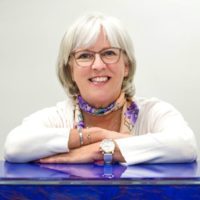
Kerry Rice, Ed. D., is a Professor in the Department of Educational Technology at Boise State University. Her research focuses on best practices in K-12 online and blended education and includes policy analysis, Delphi and mixed methods studies, and large-scale program evaluations using both traditional and emerging methods in data mining and deep learning analytics. She is the author of Making the Move to K-12 Online Teaching: Research-Based Strategies and Practices, Second Edition (2020), led the development of the Idaho K-12 Online Teaching Standards and serves as Coordinator of the Idaho K-12 Online Teaching Endorsement Program at Boise State. She is the recipient of two Fulbright Awards: a Fulbright Scholar Award to Poland in 2012-2013 and a Fulbright Specialist award to Poland for the summer of 2015.
Ginny Whitehouse
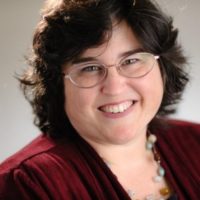
Ginny Whitehouse, Ph.D., is a Professor of Multimedia Journalism at Eastern Kentucky University. A Fulbright alumna, she also is the mother of two teenage daughters who traveled with her and did online school when she served as a Fulbright Scholar at Sofia University. Dr. Whitehouse has more than 25 years of academic leadership experience in both public and private higher education. She has served as a department chair dramatically increasing student enrollment in key programs, twice lead the redesign of converged multimedia curriculum, headed university-wide restructuring of teaching evaluation, built faculty development and mentoring programs, co-directed the premier media ethics pedagogy training workshop for over a decade, edited the Cases and Commentaries sections of the Journal of Media Ethics, and has been repeatedly recognized for innovative teaching. While a Fulbright scholar, she taught seminars in media ethics and guest lectured on fake news. She is continuing research concerning media privacy and digital impact on media organizations. She has held national positions in both her professional and academic community organizations and is recognized as a leader in media ethics pedagogy.
Moderator
Oktawia Gorzeńska
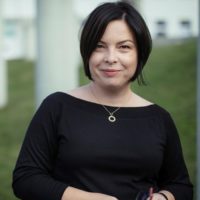
Oktawia Gorzeńska is an expert on innovations and technology in education who graduated from Leadership Academy for Poland. She has been supporting educators, institutions, foundations as well as local governments for many years. Oktawia is also a member of the steering committee and programme board of the “School for Innovator” project operated by the Polish ministries. As a former school principal she gained experience in change management. As a result her school was awarded the title of “Changemaker school” by Ashoka Foundation. Her leadership allowed the newly-built school to become “Microsoft Flagship School”. Oktawia is an author and co-author of publications on educational innovations and distant learning, also a TEDx speaker. Moreover she supports edtech start-up Photon to empower educators to use technology in education.
Platform regulation: creating boundaries for meaningful exchanges online
April 29, 2021 at 4:00-5:30 pm CET
Most of us use social media everyday. We scroll for news, entertainment or simply to stay in touch with our friends and close ones. Unfortunately, these platforms also work as a channel to spread hate speech and fake news. Anxiety, misinformation, surveillance, lack of democratic supervision are just a selection of problems social media platforms (and their users) have to deal with on a day-to-day basis.
It has become clear that the way social media platforms work should be regulated, but how and by whom? The platforms’ self regulation does not seem to work properly and given the global scale of their functioning, effective supervision is also problematic. Billions of posts, images, live streams every day make content moderation very difficult. Should social media platforms hire more people, or put more work into improving the automation processes in order to escape faulty moderation? Should legal instruments be introduced to regulate them from top down? Are there any good practices?
Apart from bringing people closer to one another, online platforms create boundaries of what can be said and who has the power to do so. In this webinar, we aim for a discussion about the new media platforms and speech policing that will explore the legal, ethical and practical perspectives.
Konrad Siemaszko

Konrad Siemaszko is a lawyer at the Helsinki Foundation for Human Rights, where he has been involved in both litigation and research projects since 2016. His work focuses on freedom of expression and on the impact of new technologies on human rights. He holds degrees in law and sociology from Warsaw University.
Jillian C. York
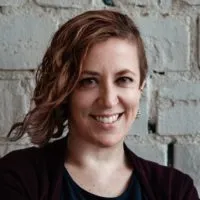
Jillian C. York is a writer and activist whose work examines the impact of technology on our societal and cultural values. Based in Berlin, she is the Director for International Freedom of Expression at the Electronic Frontier Foundation, a fellow at the Center for Internet & Human Rights at the European University Viadrina, and a visiting professor at the College of Europe Natolin.
Jillian co-founded Onlinecensorship.org, an award-winning project that seeks to encourage companies to operate with greater transparency and accountability toward their users as they make decisions that regulate speech. She is a frequent public speaker on topics including censorship, surveillance, and the impact of social media on our lives and our societies. While she contributed chapters to several books before, she quite recently published her first own book “Silicon Values”.
Moderator
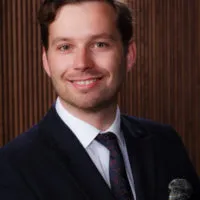
Maciej Kuziemski is a policy entrepreneur and researcher focused on the nexus of tech and society. He has been a 2018-19 Fulbright-Schuman Visiting Research Fellow at the Program on Science, Technology & Society at the Harvard Kennedy School. While at Harvard, Maciej examined US government’s algorithmic practices. In his doctoral research Maciej has been studying sociotechnical imaginaries of algorithms and their influence over public sector practices in the US and the UK. His interests include citizen empowerment, policy design and public sector innovation.
In the past, Maciej has held research, policy and advisory positions with the European University Institute in Florence, UK Department for Business, Energy and Industrial Strategy, Chancellery of the Prime Minister of Poland, and European Parliament. Maciej holds Masters in Public Policy from the University of Oxford, a B.A. in Politics from the University of Warsaw, and is the recipient of the John Lewis Fellowship and Atlantic Council Millennium Fellowship.
Troubling Matters: Disinformation and the challenges of more ‘critical thinking’
June 24, 2021 at 4:00-5:30 pm CET
The webinar offers a nuanced look into disinformation campaigns and presents a researcher’s perspective on these phenomena. Join us for a presentation followed by a Q&A session, in which Dr. Ahmer Arif will talk about human-centered responses to disinformation that go beyond mere fact checking.
In this webinar, we will discuss how our social computing systems are being used to intentionally spread misleading information and what we — as educators and designers — might do to address this. Drawing on examples from his research into disinformation campaigns, Dr. Arif will add nuance to our understanding of what they are, and confront four commonly held misconceptions about how these campaigns work.
Specifically, our speaker will focus on the structure and dynamics of these campaigns as they targeted: 1) a humanitarian response group operating in the Syrian Civil War; and 2) a highly charged conversation in 2016 about police violence in America and the #BlackLivesMatter movement. Dr. Arif will integrate the findings from these separate studies and draw on the literary theory of postcritique to broaden our repertoire of ideas on how we might address mis- and disinformation.
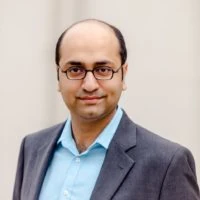
Ahmer Arif is an assistant professor at The University of Texas at Austin in the School of Information. His research falls at the intersection of computer science and social science and is situated within the fields of Human-Computer Interaction (HCI) and Computer Supported Cooperative Work (CSCW). He currently studies how people use communication technologies like social media to spread, shape and confront disinformation and misinformation.
He also conducts research into designing experiences in which we can reflect on our participation in these information spaces and the effects they are having on us. Beyond academia, he has had the good fortune to work as a researcher and consultant with several large organizations like Facebook, Yahoo!, The World Bank and the UN.
Learn more at ahmerarif.com.


